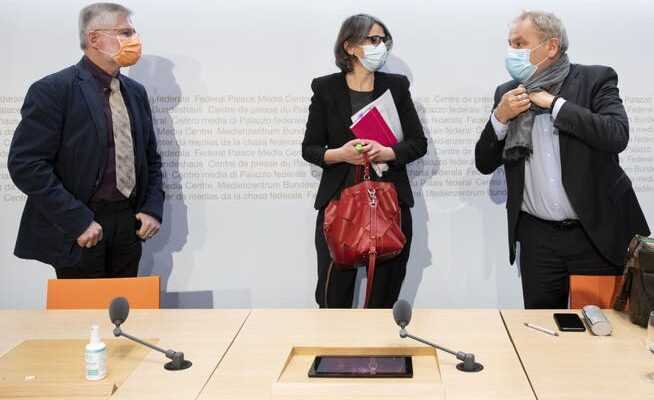The administration seems to have lost the Swiss pursuit of perfection and precision. This shows their processing of the Corona crisis.
Now the office should consider what data should be collected and published. Patrick Mathys, Head of the FOPH Crisis Management and International Cooperation Section, Anne Lévy, FOPH Director, and Rudolf Hauri, Zug Canton Doctor, from right.
The corona pandemic is not over. But it no longer dominates our everyday lives as it did just a few months ago. Good this way.
Of course, we must not forget: a few dozen people with Covid-19 continue to end up in hospital every day – some even die. However, the average number of people who die with the disease is now just over one person per day. Death is terrible. But the average number of people who die in Switzerland every day is 200 – without Covid-19. It is quite likely that one of them will have tested positive for the virus given the continued large number of new corona infections.
For the vast majority of Swiss people, thanks to vaccination, probably also thanks to the higher temperatures and thanks to the obviously milder omicron variant, we are learning to live with the virus.
Only the BAG should be in crisis mode
Basically, there is only one place that should let the corona virus set the pace: the Federal Office of Public Health (BAG). Crisis mode is still required here. Because we want to know from the BAG at an early stage whether we will have to reckon with a new wave of new infections and a new, more dangerous corona variant.
However, if you look at the steps the office is taking to record the current state of the pandemic and to monitor the state of health of the population with Covid-19, one has to be dismayed: Here someone is at best satisfied with mediocrity.
This does not mean that the Federal Office will fall back into panic mode and begin to decide on some senseless measures; it is also not about increasing the frequency of publication of the new corona numbers. These are only published weekly. That’s a sensible decision. Trend reversals cannot be read from the daily data.
What data is really important
Instead, the office should now consider what data should be collected and published. For example, it could systematically record how big the problem of long-term consequences of a Covid-19 disease is. How many people actually suffer from Long-Covid?
Equally important would be the systematic implementation of seroprevalence studies. So the answer to the question: How widespread is protection against the corona virus in the population, whether it is through infection or vaccination? The last usable data on this is from August 2021, when as part of the “Corona Immunitas” project in some cantons around 80 percent of the population was found to be immune. A role model here is Great Britain, where in studies a seroprevalence of currently around 99 percent of the population has been demonstrated.
What also falls under the table in Switzerland is the documentation of which coronavirus variant dominates the infection process. In South Africa, for example, there is an increase in cases again. It is probably due to new omicron subvariants. South Africa can only determine this because it records these subvariants.
“Of course we also made mistakes”
The BAG director Anne Lévy recently wrote in a guest commentary for the NZZ: “Of course we also made mistakes, especially at the beginning.” Only to then submit: “How could it be otherwise in a crisis that we have never experienced to this extent and where knowledge about the pathogen Sars-CoV-2 and the disease Covid-19 was sparse?” Lévy is apparently satisfied with what she now knows about the virus. The ambition to find out more and to share the knowledge gained with the public – notably a public whose health the FOPH is commissioned to protect – does not seem to exist.
The expectations of the top health official in Switzerland are different. In Switzerland, as in so many other places, the standards are high. The pandemic situation should be monitored as conscientiously and transparently as possible using the very latest technologies and strategies so that we are spared any nasty surprises in autumn. «Swiss made» does not stand for precision and reliability for nothing.
